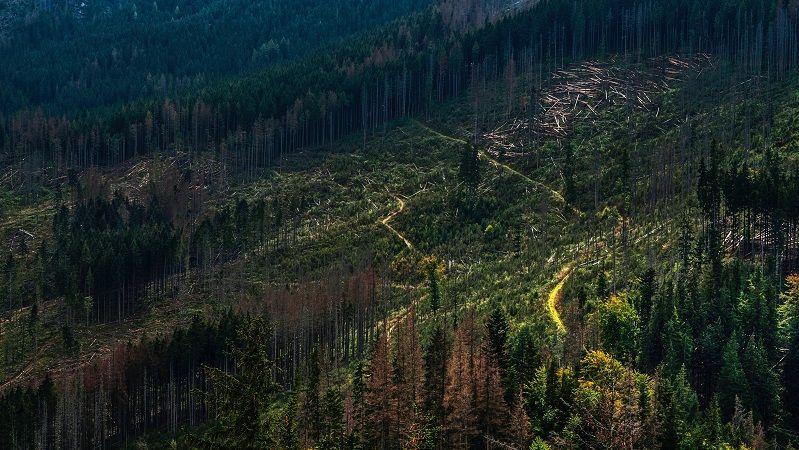Agriculture is fundamental to the Brazilian economy yet climate change means crop yields are being reduced and the amount of suitable land for crops is shrnking
Here, Peter Elwin, director of fixed income and head of food and land use programme at Planet Tracker answers ESG Clarity‘s questions.
What impact is the world’s largest rainforest having on the climate?
Given the vast expanse of the Amazon rainforest, it has a very significant impact on regional weather patterns and is an essential source of water for rivers across South America, particularly the La Plata River basin.
Deforestation reduces the Amazon’s ability to generate rainfall, threatening the water levels in these rivers, which would have detrimental effects on hydroelectric power production, commodity exports via river transportation, and water supply. As discussed in our Brazil report, there is proof that deforestation is affecting Brazil’s hydrological cycle and causing regional climate changes. It interferes with the cooling effect, causing the area to warm up even more and raising the possibility of more frequent and severe heatwaves. Given the Amazon’s significance for Brazil’s climate, there is a significant risk that global and regional climate change combine with local deforestation to drive a feedback loop where the Amazon ceases to function as a rainforest and this in turn leads to more dramatic changes in Brazil’s climate.
Why is this so important to address? What about economic impact?
Agriculture is fundamental to the Brazilian economy. In 2021, the sector contributed 27.6% of GDP. Agriculture is also the largest component of Brazil’s external trade, with agricultural products responsible for 39% of total exports in 2020.
Climate change will impact Brazil’s agricultural productivity in two ways: Crop yields may be reduced and the area of land suitable for growing particular crops may be reduced. Extreme weather over the past decade has already highlighted how sensitive agricultural output can be to drought conditions.
Our research for the Brazil report looked into the findings of academics who have delved into how climate change might affect Brazil’s production of soft commodities by 2050 and some of their key findings include:
• Soy and maize yields could fall by more than 66% and 50% respectively
• ‘Low risk’ areas for growing soy could shrink by 65%
• ‘Low risk’ areas for growing coffee could shrink by 76%
What is the impact on investors?
Currently, sovereign bond investors are exposed to significant risks from deforestation, particularly those holding longer dated bonds. Equity investors in domestic Brazilian agribusiness companies are obviously exposed to the macro-economic risks set out in this report, but importantly, so are investors in companies across the Brazilian economy. Equity investors holding shares in multinational food system companies are also exposed through the supply chains of those companies because of Brazil’s significance as a source of key ingredients.
What changes to their policies and portfolios should investors be adopting both to limit their own exposure but to support on-the-ground change?
Global Canopy’s Forest500 benchmark’s financial institutions and shows that two-thirds of them lack any useful policies for removing deforestation risk from their portfolios. Investors should begin by establishing procedures and policies to assess the risk of deforestation associated with their investments and update the public on their progress. Their participation and vote on shareholder resolutions should be consistent with the requirement to end deforestation.
Has the election of Lula da Silva as president offered any hope for changes?
Brazil’s NDC already obligates the nation to end deforestation by 2030, but an earlier deadline could be set. However, deeds are more significant than words. The new Brazilian government needs to increase funding for enforcement mechanisms right away to ensure that illegal deforestation is stopped, as well as funding for better land registration procedures to make clear Indigenous Peoples’ land rights (and prevent land theft). Reducing these investment risks will increase the potential returns for investors and draw outside investment to Brazil.
How can investors play a part?
Sovereign investors should exert pressure on the Brazilian government using collective mechanisms like the Investors Policy Dialogue on Deforestation (IPDD) and should support the Central Bank of Brazil’s efforts to green the Brazilian financial system. In order to support sustainable business practices in Brazil, investors can also support initiatives like IFACC.
Investors generally rely on company disclosures to assess the risk of deforestation, but these disclosures are inconsistent: some companies disclose a wealth of insightful data, while many others supply far too little (and a minority still provide nothing useful). Information on the location (country) and volume (or proportion) of production (in-house or further up the supply chain) is the essential missing component; this is important for both fundamental investment analysis and risk assessment, such as assessing deforestation.
Investors should use their engagement mechanisms to put pressure on management teams of companies to provide greater information and credible assurance about their supply chain due diligence (zero deforestation) procedures.








